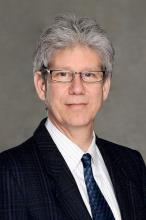
Marc Rosen, PhD
Professor
Automotive, Mechanical and Manufacturing Engineering
Faculty of Engineering and Applied Science
Automotive, Mechanical and Manufacturing Engineering
Faculty of Engineering and Applied Science
With over 70 research grants and contracts and 900 technical publications, including numerous books, Dr. Rosen is an active teacher and researcher in sustainable energy, sustainability, and environmental impact. Much of his research has been carried out for industry.
Full biography
With over 70 research grants and contracts and 900 technical publications, including numerous books, Dr. Rosen is an active teacher and researcher in sustainable energy, sustainability, and environmental impact. Much of his research has been carried out for industry.
Areas of expertise
Courses
- MECE 2320UThermodynamicsIntroductory concepts and definitions; energy, work and heat; the nature of thermodynamics; the First Law of Thermodynamics; the Second Law of Thermodynamics; control mass and control volume analyses; properties and behaviour of pure substances; ideal gases and mixtures; equation of state for a perfect gas; irreversible and reversible processes; the Carnot cycle; entropy; Clausius inequality; entropy change in open and closed systems; isentropic processes; introduction to exergy; power and refrigeration cycles.
- MECE 2860UFluid mechanicsFundamentals of fluid mechanics, including: properties of fluids and their units; fluid static. Kinematics of fluids, conservation of mass and the continuity equation. Dynamics of fluids; Euler equation; Bernoulli equation. The energy equation; energy grade lines. Flow of viscous fluids; laminar and turbulent flows; flow in pipes and fittings; the Moody diagram. Flows around immersed bodies; lift and drag on bodies. Boundary layers; flow separation. Flow measurement techniques.
- ENGR 3200UEngineering graphics and designEngineering drawing techniques, dimensions and geometric tolerances, standard viewpoints and section planes, orthographic projections, use of 3-D solid modelling and CAD software (and possibly other design and graphics software); a case-based introduction to engineering design; use of graphics and illustrations in engineering design; design projects by individuals and groups; basics of project management, such as organizing, planning, scheduling and controlling; application of such computer tools as spreadsheets, project management software, computer-aided drafting and design tools.
- MECE 3930UHeat TransferIntroduction to conduction, convection and radiation. Solutions to steady-state and transient conduction problems. Heat conduction across contact surfaces and cylindrical walls. Heat generation in conduction. Solutions to convection problems for laminar and for turbulent flows. Forced and natural convection. Boiling and condensing heat transfer. Two phase flow in a channel. Critical heat flux. Heat exchangers, and heat exchanger effectiveness and operational characteristics.
- MECE 4430USustainable and Alternative Energy TechnologiesDescriptions of systems and design issues and parameters, including performance, operating characteristics, reliability. Small-scale hydraulic energy. Tidal and wave energy. Solar energy systems, including photovoltaics and thermal systems. Wind energy systems. Biomass energy. District energy. Hydrogen energy systems, including production, storage, transport and utilization technologies. Fuel cells: fundamentals such as fuel cell thermodynamics, electrode kinetics; and types, including proton exchange membrane and solid oxide fuel cells. Energy storage, including thermal, compressed air and battery storage. Geothermal energy systems. Magnetohydrodynamics, thermoetrics, thermionics. Future directions.
- MECE 4450UThermal Environmental EngineeringHeating, ventilating, air conditioning and refrigeration. Psychrometrics and psychrometric processes. Sensible heating and cooling, cooling and dehumidification, mixing and humidification. Ventilation and room air distribution. Human comfort. Indoor air quality. Refrigeration and refrigeration systems. Design of air conditioning and heating systems. Equipment selection. Duct and fan design. Pump and piping design. Energy management in buildings.
- ENGR 5014GPollution Prevention and Sustainable EngineeringIndustry-environment interactions; pollution prevention; sustainability and sustainable development; sustainable engineering; industrial ecology; environmental impacts and concerns; material and energy budgets, life-cycle assessment, reduction of industrial process wastes (solid, liquid, gaseous); design for environment; design for energy use and efficiency; energy sustainability; industrial applications.
- ENGR 5161GHVAC and Refrigeration Systems Design and AnalysisBasic concepts. Elements of heat transfer for buildings. Thermodynamic processes in buildings. Energy use and environmental impact. Human thermal comfort and indoor air quality. Fluid mechanics in building systems. Solar radiation. Heating and cooling loads. Annual energy consumption. Heat transfer equipment. Cooling equipment. Thermal energy storage. Software use and tests.
Education
- 1987PhD - Mechanical EngineeringUniversity of Toronto, Toronto, Ontario
- 1983MASc - Mechanical EngineeringUniversity of Toronto, Toronto, Ontario
- 1981BASc - Engineering Science (Nuclear and Thermal Power Generation Option)University of Toronto, Toronto, Ontario
Affiliations
- Engineering Institute of Canada
- International Journal of Energy and Environmental Engineering
- Sustainability
- Canadian Society for Mechanical Engineering


